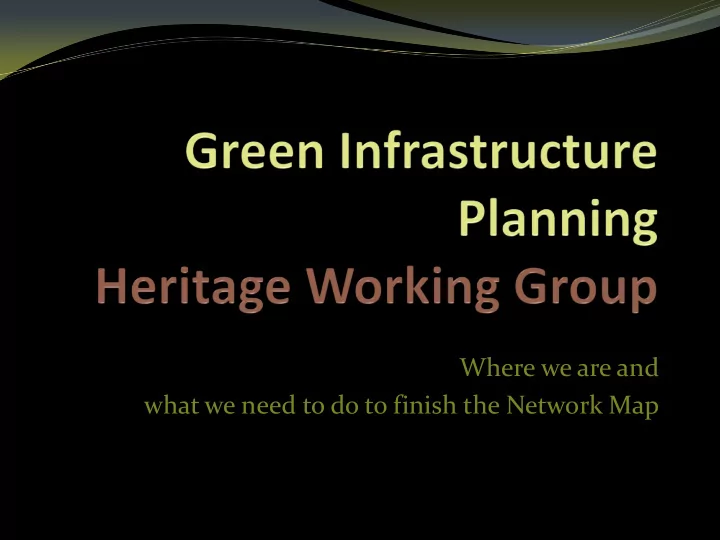

Where we are and what we need to do to finish the Network Map
Green Infrastructure Planning Disciplinary Foundations Environmental Planning and Landscape Design GIS and Spatial Analysis Landscape Ecology and Conservation Biology
Green Infrastructure Planning Planning Elements - General Leadership Forum Provides science-based process Identifies key partners Network Design Incorporates conservation science Expresses data needed to achieve goals Promotes pro-active, systematic, large-scale conservation action Implementation Quilt Allows for cooperation among diverse programs and projects Provides possibility of greater predictability and certainty
Green Infrastructure Planning Project Planning - General Goals – specific statements of project intent Objectives – quantifiable methods for implementing goals (what, how much, and by when) Scale & extent – study area definition Planning outcomes – likely elements in long-term Implementation Quilt Landscape types – provide rationale for deciding what resource attributes or features to include and connect within Green Infrastructure Network Landscape attributes – provide direction re: data needed
Green Infrastructure Planning Project Planning – Our version Goals - to develop a strategic conservation planning tool Objectives – to create a Green Infrastructure Network map that will serve as a planning tool for the study area planning agencies, conservation efforts, and developers & builders, and increase public awareness Scale & Extent - Planning area boundaries of Farmington, Fayetteville, Greenland, Johnson and parts of Washington Co. over to Wedington Wildlife Mgmt Area. Planning Outcomes – Network Map and online map server will highlight and guide many possible patches in Implementation Quilt Landscape Types – forested areas, prairie remnants, heritage & cultural sites, parks & trails Landscape Attributes - provided by the Working Groups and the Urban Forestry Conservation Assessment (2005)
Green Infrastructure Planning Planning Elements- GIS & Network Map technicalities Leadership Forum Provides guidance for GIS parameters Network Design Develop cores, hubs, and corridors Integrate data and Leadership Forum guidelines Network characterization and prioritization Value weighting Vulnerability ranking (ex: development pressure) Restoration targeting Suitability Analysis Refines usefulness of network (ex: adjacent to conservation easement or buffers quarry) Subjective but not arbitrary Implementation Quilt Suitability Analysis offers many options for making information out of the data on the Working Group Maps
Green Infrastructure Planning Network Map Elements: Cores, Hubs, Corridors & Sites
What needs doing… HWG Network development For the Heritage/Cultural area of interest we can’t follow the conservation based Green Infrastructure Planning guidelines for creating the network map exactly, so….we get to decide certain things for ourselves Core/Hubs or Sites or both Cores/Hubs have minimum size limit…relatively large areas Sites are points Can have both Corridors
HWG Network development Develop cores/hubs Need to decide on a size limit for cores/hubs (see acreage on parcels report) Questions to consider: No matter what we do: Decide if all the items included on the working map should be included on the Network Map? Many of the places are just dots on the map; do we need to consider the whole parcel that the place sits on? No matter what we do: Same type of item should all be parcel or point Should the same size limit be placed on all the different types of parcels? Go with only Sites Will need to convert parcels to points Should all the buildings just be points Use both Sites and Core/Hubs Which type of items should be parcels and which points? Will need to answer core/hub questions
HWG Network development Corridors Should all linear elements become corridors? How wide should they be represented? Consider if we should use technical method to define additional corridors
And…something to consider for the Implementation phase Suitability Analysis: What suitabilities might we want to analyze? Qualitative Presence/absence of more than 1 element of network (ex: working farm core has cultural site, riparian corridor, and adjacency to park) Quantitative Assign values to types of elements (ex: forest cores within city planning boundary assigned higher value than forest cores outside city planning boundary, wetlands assigned high value no matter where located)
Thank you for braving the technicalities We’re getting it done!
Recommend
More recommend